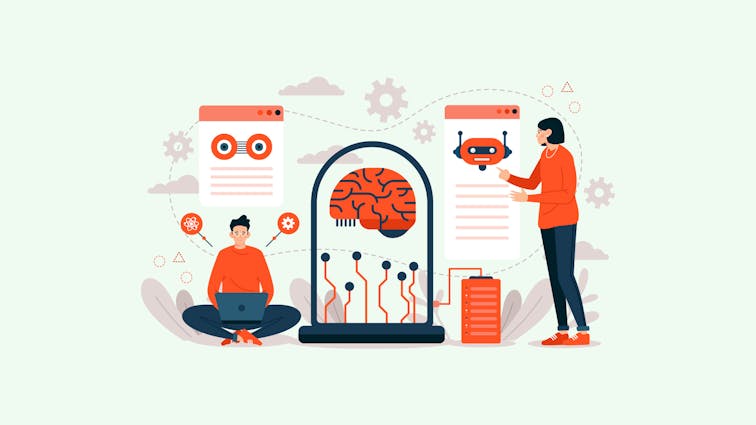
Unveiling the Future: Exploring the Benefits of AI in eCommerce
Artificial Intelligence (AI) has become an integral part of our daily lives, subtly influencing everything from our online searches to our shopping habits.
Its impact is particularly profound in the realm of e-commerce, where it has revolutionized the way businesses operate and interact with customers.
As the digital marketplace continues to expand and evolve, AI’s role in shaping the future of e-commerce is becoming increasingly significant.
AI in e-commerce is not just about futuristic concepts or high-tech innovations; it’s about practical applications that enhance customer experiences and drive business growth.
From personalized product recommendations and enhanced customer service to targeted marketing and automated customer journeys, AI is transforming the e-commerce landscape in ways we could only imagine a few years ago.
The rise of AI in e-commerce is not a sudden phenomenon. It’s the result of years of technological advancements and a shift in consumer behavior towards online shopping.
As more businesses recognize the potential of AI to boost engagement and increase sales, its adoption in the e-commerce sector has skyrocketed.
This article will delve into the key benefits of AI in e-commerce, explore its specific applications, and look ahead to what the future might hold for this exciting intersection of technology and commerce.
Whether you’re a seasoned e-commerce professional or a newcomer to the industry, understanding the role of AI in e-commerce is crucial to staying competitive in this rapidly evolving digital marketplace.
What is AI?

Artificial Intelligence (AI), at its core, is a branch of computer science that aims to create machines capable of mimicking human intelligence.
This involves learning from experience, understanding complex concepts, recognizing patterns, and making decisions that optimize the chances of achieving specific goals.
AI systems can range from simple rule-based systems to complex machine learning models and neural networks that can learn and adapt over time.
How AI Works in eCommerce
In the context of e-commerce, AI works by collecting and analyzing vast amounts of data to gain insights into customer behavior, preferences, and purchasing patterns.
This data can include browsing history, past purchases, clicked links, and even the time spent viewing particular products.
AI algorithms then use these insights to personalize the shopping experience, make product recommendations, predict future trends, and automate various tasks.
For instance, AI can analyze a customer’s past purchases and browsing history to recommend products they might be interested in.
This level of personalization not only enhances the shopping experience but also increases the likelihood of purchases.
According to a study by Accenture, 91% of consumers are more likely to shop with brands that provide relevant offers and recommendations.
AI also plays a crucial role in automating various tasks in e-commerce, such as inventory management, customer service, and marketing.
AI-powered chatbots, for example, can handle customer inquiries round the clock, providing instant responses and freeing up human resources for more complex tasks.
The Evolution of AI in eCommerce

The use of AI in e-commerce has evolved significantly over the years. In the early days, AI was primarily used for basic tasks like tracking inventory and automating repetitive tasks.
However, with advancements in machine learning and data analytics, AI’s role in e-commerce has expanded to include more complex functions like personalization, predictive analytics, and customer service.
The evolution of AI in e-commerce can be seen in the growing adoption of AI technologies by businesses.
According to a report by Gartner, the number of businesses using AI has increased by 270% over the past four years. This trend is expected to continue as more businesses recognize the potential of AI to enhance customer experiences and drive growth.
Furthermore, the advent of technologies like voice assistants (e.g., Amazon’s Alexa, Google Assistant) and AI-powered recommendation engines has further transformed the e-commerce landscape, making shopping more interactive and personalized than ever before.
Key Benefits of AI in E-commerce:
Here are the some key benefits of ai in ecommerce
Ⅰ. AI in Enhancing Customer Experience

The advent of AI has brought about unprecedented advancements in enhancing the customer experience in eCommerce.
It’s reshaping how consumers interact with online retailers, making the shopping experience more personalized, efficient, and enjoyable.
A. Personalization: Tailoring the Shopping Experience
Personalization is one of the key ways AI is transforming the eCommerce landscape.
Today’s consumers expect a shopping experience that’s tailored to their preferences and behaviors, and AI is the tool that makes this possible.
1. Product Recommendations: The AI Personal Shopper
AI has the capacity to analyze a customer’s previous purchases, browsing history, and other data to provide personalized product recommendations.
This functions like a personal shopper, suggesting items that the customer is likely to be interested in, thereby increasing both customer satisfaction and sales.
2. Personalized Content: Engaging Customers on Their Own Terms
Beyond product recommendations, AI also allows for personalized content delivery. This could include tailored promotions, personalized emails, or even customized user interfaces.
By presenting customers with content that’s relevant to their interests and shopping habits, businesses can engage customers more effectively and improve conversion rates.
B. Customer Support: AI Chatbots at the Forefront
AI is revolutionizing customer support in eCommerce through the use of chatbots.
These AI-powered assistants can interact with customers in real-time, answering questions, resolving issues, and providing information.
1. 24/7 Availability: No More Waiting Lines
One of the biggest advantages of AI chatbots is their availability. Unlike human customer service representatives, chatbots can be available 24/7, providing immediate assistance at any hour of the day.
This means no more waiting lines for customers, leading to increased customer satisfaction.
2. Efficient Query Resolution: Quick Answers, Happy Customers
AI chatbots can quickly provide answers to common customer queries by drawing upon a vast database of information.
They can handle multiple inquiries simultaneously, increasing efficiency and ensuring that customers receive quick and accurate responses.
C. User Interface and Navigation: Streamlined Shopping with AI
AI is also enhancing the user interface and navigation in eCommerce, making it easier for customers to find and purchase the products they want.
1. Visual Search: Finding Products through Images
One such advancement is visual search, which allows customers to search for products using images.
For example, a customer could upload a picture of a dress they like, and the AI would find similar items available in the online store. This creates a seamless and intuitive shopping experience.
2. Voice Assistants: Hands-Free Shopping Experience
Voice assistants powered by AI, like Amazon’s Alexa or Google Assistant, are providing a hands-free shopping experience.
Customers can simply speak their commands to search for products, read reviews, and make purchases.
This not only enhances accessibility for customers with visual impairments or physical disabilities but also adds a layer of convenience for all users.
D. Simplified Checkout Process
One major area where AI can enhance the customer experience is the checkout process.
AI technologies like facial recognition and machine learning can be used to simplify and expedite the checkout process, reducing wait times and improving customer satisfaction.
Amazon’s “Just Walk Out” technology in their Amazon Go stores is a perfect example. Customers simply walk into the store, pick up the items they want, and walk out.
The AI system automatically detects the items picked up, links them to the customer’s Amazon account, and charges them accordingly, eliminating the need for traditional checkout lines.
Ⅱ. AI in Streamlining Business Operations

AI’s influence extends beyond the realm of customer experience, playing a crucial role in streamlining business operations for eCommerce as well.
It offers transformative solutions to traditional challenges in inventory management, pricing strategies, and supply chain optimization.
A. Inventory Management: Never Out of Stock
AI is revolutionizing inventory management in eCommerce, helping businesses ensure they are never out of stock while avoiding overstocking.
1. Predictive Analytics: Forecasting Demand and Supply
With the power of predictive analytics, AI can analyze past sales data, current market trends, seasonal variations, and more to accurately forecast demand.
This allows businesses to plan their supply chain activities effectively, ensuring they have the right products in the right quantities at the right time.
2. Optimized Storage: Reducing Costs and Waste
AI can also optimize storage by determining the best placement of products in warehouses based on factors such as product size, weight, and sales velocity.
This leads to more efficient use of warehouse space, reducing storage costs and minimizing waste.
B. Pricing and Discount Strategies: Maximizing Profit Margins
AI is instrumental in developing sophisticated pricing and discount strategies that maximize profit margins while attracting and retaining customers.
1. Dynamic Pricing: Responding to Market Changes in Real-Time
AI-powered dynamic pricing tools can analyze a myriad of factors in real-time, such as demand, competition, and customer behavior, to adjust prices accordingly.
This allows businesses to maximize profitability while remaining competitive in the market.
2. Personalized Discounts: Attracting Customers Without Undercutting Profits
AI can also personalize discounts based on individual customer behavior, loyalty, and purchase history.
This ensures that discounts are given to customers who are likely to be influenced by them, rather than indiscriminately reducing prices, thereby protecting profit margins.
C. Supply Chain Optimization: AI for Efficient Logistics
AI is making significant strides in optimizing the supply chain, which is critical for timely product delivery and customer satisfaction in eCommerce.
1. Route Optimization: Reducing Delivery Time and Costs
By analyzing factors like traffic conditions, weather, and delivery locations, AI can optimize delivery routes.
This not only reduces delivery time, improving customer satisfaction, but also cuts down on fuel consumption and costs.
2. Predictive Maintenance: Keeping the Supply Chain Running Smoothly
AI can also predict when machines or vehicles in the supply chain are likely to require maintenance or repairs.
By scheduling preventive maintenance, businesses can avoid unexpected breakdowns and delays, keeping the supply chain running smoothly.
Ⅲ. AI in Marketing and Sales

AI is making waves in the world of marketing and sales, providing invaluable tools for understanding customer behavior, automating marketing efforts, and even generating content.
A. Predictive Analysis: Understanding and Predicting Customer Behavior
AI-based predictive analytics can examine past customer behavior to predict future actions, helping businesses to anticipate customer needs and tailor their offerings accordingly.
1. Customer Segmentation: Targeting the Right Audience
For example, AI can segment customers into distinct groups based on shared characteristics such as buying patterns, preferences, and demographics.
A clothing retailer might use AI to identify a segment of customers who frequently purchase activewear, then target them with promotions for new athletic clothing lines.
2. Sales Forecasting: Planning for Future Growth
Furthermore, AI can help with sales forecasting by using historical sales data and market trends to predict future sales.
For instance, a bookstore could use AI to predict increased demand for certain genres or authors, helping them to stock up in advance and maximize sales.
B. Automating Marketing Efforts: Reaching Customers Efficiently
AI is also streamlining marketing efforts by enabling automation, resulting in more efficient and effective campaigns.
1. Email Marketing: Personalized Messages at Scale
AI can automate personalized email marketing campaigns, sending tailored messages to thousands of customers at once.
A travel agency might use AI to send personalized travel recommendations to customers based on their past bookings and expressed interests, enhancing engagement and conversion rates.
2. Social Media Marketing: Optimizing Content and Timing
AI can also optimize social media marketing by determining the best times to post and the type of content that resonates with the audience.
A restaurant could use AI to analyze when their followers are most active and what kind of posts (e.g., food photos, recipe videos, special promotions) generate the most engagement.
C. Content Generation: AI as a Creative Tool
AI is now even entering the realm of content creation, generating high-quality marketing materials and product descriptions.
1. Automated Ad Creation: Instant, High-Quality Marketing Materials
AI can generate ads automatically, selecting the right images, text, and layout based on what’s likely to appeal to the target audience.
An online furniture store, for example, might use AI to create ads showcasing their bestselling products in attractive, eye-catching designs.
2. Product Descriptions: Detailed and Consistent Information for Customers
AI can also help create consistent, detailed product descriptions.
For example, an electronics retailer could use AI to generate product descriptions that highlight key features, specifications, and benefits, providing customers with the information they need to make informed purchase decisions.
Ⅳ. AI in Security and Fraud Prevention

In the realm of eCommerce, AI plays a crucial role in enhancing security and preventing fraud.
As online transactions become increasingly prevalent, so do attempts at fraudulent activities, making AI an indispensable tool for maintaining a safe and trustworthy eCommerce environment.
A. Fraud Detection: Keeping eCommerce Safe and Trustworthy
AI algorithms are exceptional at detecting fraudulent activities. They can analyze thousands of transactions in real-time, identifying patterns and behaviors associated with fraud.
This not only helps in detecting fraudulent transactions but also assists in preventing them in the first place.
1. Real-Time Monitoring: Catching Fraudulent Activities As They Happen
AI systems can monitor transactions in real-time, immediately flagging suspicious activities for review.
This instantaneous response can prevent fraudulent transactions from being processed, saving businesses from potential losses.
2. Risk Assessment: Evaluating Transactions for Fraud Potential
AI can also assess the risk level of transactions by analyzing factors such as the transaction amount, location, and device used.
High-risk transactions could then be subjected to additional security measures, like two-factor authentication.
B. Data Security: Protecting Customer Information
AI plays a key role in data security. It can detect and respond to cyber threats, protecting sensitive customer information from breaches.
Additionally, AI can identify weak points in a system’s security, enabling businesses to reinforce their defenses proactively.
1. Anomaly Detection: Identifying Unusual Activities
Through anomaly detection, AI can identify unusual behaviors or patterns that deviate from the norm.
This is particularly useful in identifying new types of fraud or cyber-attacks that haven’t been encountered before.
2. Secure Authentication: Ensuring Only Authorized Access
AI can improve secure authentication methods, ensuring that only authorized individuals have access to certain information.
This can include biometric authentication methods such as facial recognition or fingerprint scanning.
Ⅴ. AI in Data Analysis and Decision Making

Beyond its applications in customer experience and operations, AI is also instrumental in helping businesses analyze data and make informed decisions.
A. Deep Learning: Uncovering Hidden Patterns in Data
Deep learning, a subset of AI, can analyze vast amounts of data and uncover hidden patterns that might not be apparent to humans.
For example, a fashion retailer might use deep learning to discover emerging trends in color preferences or style choices among their customers.
1. Customer Behavior Analysis: Gaining Deeper Insights into Shopping Habits
By analyzing customer behavior, AI can provide insights into shopping habits, preferences, and trends.
These insights can inform various aspects of business strategy, from product development to marketing and sales.
2. Market Trends: Staying Ahead of the Curve
AI can analyze market trends, helping businesses to stay ahead of the curve.
This can involve tracking competitor activities, monitoring changes in consumer behavior, and predicting future trends.
B. Decision Support Systems: AI as a Strategic Partner
AI can be used in decision support systems, providing businesses with data-driven insights to inform their strategies.
For example, a cosmetics company might use an AI system to analyze customer reviews and feedback, guiding their product development efforts.
1. Scenario Analysis: Making Informed Decisions
Through scenario analysis, AI can predict the potential outcomes of different business strategies.
This can help businesses to weigh the pros and cons of each option and make more informed decisions.
2. Performance Tracking: Understanding Business Progress in Real-Time
AI can also assist in tracking business performance in real-time, providing insights into sales, customer engagement, and other key metrics.
An online electronics store might use AI to monitor their sales performance across different categories and adjust their marketing strategies accordingly.
Case Studies: Successful Implementations of AI in eCommerce

A. Case Study 1: AI in Amazon’s Success
Amazon is a prime example of how AI has been successfully implemented in eCommerce.
They utilize AI to enhance every aspect of their business, from personalized shopping experiences to supply chain management and fraud prevention.
Optimized Recommendations: Personalizing the Shopping Experience
One of the most well-known uses of AI in Amazon’s platform is their personalized recommendations engine.
By analyzing customer browsing history, purchasing patterns, and preferences, Amazon can provide tailored product suggestions that cater to individual tastes, driving sales and boosting customer satisfaction.
Inventory Management: Streamlining Supply Chain Operations
AI also aids Amazon in optimizing their inventory management and supply chain operations.
Through forecasted demand, the AI system can predict which products need to be stocked in advance, minimizing storage costs and ensuring stock availability for customers.
Enhanced Customer Service: Speedy and Accurate Assistance
Amazon’s AI-powered chatbot, Alexa, provides instant and accurate assistance to customer inquiries and concerns.
Equipped with natural language processing capabilities, Alexa can understand and respond to customer queries efficiently, improving the overall customer service experience.

B. Case Study 2: How AI Transformed Alibaba
Alibaba, one of the largest eCommerce companies in the world, has also effectively integrated AI solutions into their business operations, transforming the way they approach eCommerce.
Smart Search: Delivering Relevant and Contextual Results
Alibaba’s AI-powered smart search engine offers more relevant and contextual results for users searching for products.
By understanding user intent and analyzing their search history, the AI system provides a tailored and efficient shopping experience.
Visual Recognition: Seamless Image-Based Search
AI-powered visual recognition technology on Alibaba’s platform allows users to search for products using images rather than keywords.
This helps customers to find products they’ve seen and liked elsewhere while also discovering similar options.
Fraud Detection: Safeguardinging the Platform
Alibaba employs AI-driven fraud detection and prevention measures to protect both buyers and sellers on its platform.
By analyzing user behavior, payment patterns, and historical data, the AI system can identify potential fraudulent activities and take appropriate measures to prevent them, ensuring a secure trading environment.

C. Case Study 3: How Sephora Utilizes AI for Personalized Beauty Recommendations
Global beauty brand Sephora uses AI technology to provide customers with personalized beauty recommendations, improving the shopping experience.
Virtual Try-On: Testing Products Before Purchase
Sephora’s AI-driven virtual try-on feature allows customers to test various beauty products using augmented reality.
With the help of AI, users can see how different makeup products would look on their skin without physically trying them on, aiding them in making
informed purchasing decisions.
Personalized Skincare Recommendations: Identifying the Right Products for Each Customer
Sephora’s AI-powered skincare analysis tool collects information about customer’s skin types, concerns, and preferences, and combines that with data on its product offerings.
This enables the AI system to provide personalized skincare recommendations that meet each customer’s unique needs, enhancing overall satisfaction and increasing the likelihood of repeat purchases.
Customized Product Bundles: Crafting Tailor-Made Offers
The AI system also helps Sephora in creating customized product bundles tailored to individual customer’s preferences and needs.
This not only offers a unique and personalized shopping experience but also drives increased sales by bundling complementary products together.
Future Perspectives: Opportunities for Continued AI Integration in eCommerce

The future of eCommerce is intrinsically tied to the advancements in artificial intelligence (AI).
As AI continues to evolve, it presents a myriad of opportunities for its integration into eCommerce.
Here are some perspectives on how AI can further revolutionize the eCommerce industry:
- Personalized Shopping Experience: AI can analyze customer behavior and preferences to provide a highly personalized shopping experience. This could include product recommendations based on past purchases, browsing history, and other online behavior.
- Voice Commerce: With the rise of voice assistants like Alexa, Siri, and Google Assistant, voice commerce is set to become a significant part of eCommerce. AI can be used to improve voice recognition systems, making it easier for customers to shop using voice commands.
- Visual Search: AI can enhance visual search capabilities in eCommerce. Customers can upload an image, and AI can analyze it to find similar products. This can make the shopping experience more intuitive and convenient.
- Chatbots and Virtual Assistants: AI-powered chatbots and virtual assistants can provide 24/7 customer service, answering queries, and providing product recommendations. They can also learn from each interaction, improving their ability to assist customers over time.
- Inventory Management: AI can help with inventory management by predicting demand for products based on historical data and current market trends. This can help businesses avoid overstocking or understocking issues.
- Fraud Detection: AI can be used to detect fraudulent transactions in real-time, protecting businesses and customers. It can analyze patterns and flag suspicious activity, making eCommerce more secure.
- Augmented Reality (AR) Shopping: AI can enhance AR shopping experiences, allowing customers to virtually try on clothes or see how furniture looks in their home before making a purchase.
- Data Analysis: AI can analyze vast amounts of data to provide insights into customer behavior, market trends, and the effectiveness of marketing campaigns. This can help businesses make data-driven decisions.
- Automated Marketing: AI can automate various marketing tasks, such as email marketing, social media posting, and ad targeting. This can increase efficiency and effectiveness of marketing efforts.
- Supply Chain Optimization: AI can optimize the supply chain by predicting potential disruptions and suggesting alternative routes or suppliers.
Conclusion: Embracing AI for a Bright er eCommerce Future
As evident from the various case studies and applications discussed, AI has a significant and transformative impact on the eCommerce ecosystem.
Embracing AI technology has proven to be not only beneficial for businesses seeking to optimize their processes, personalize customer interactions, and enhance decision-making capabilities but also instrumental in building a seamless, engaging, and satisfactory shopping experience for customers.
Key Takeaways:
- AI-powered systems enable enhanced personalization through tailored product recommendations and customized offers.
AI can optimize back-end processes such as inventory management, supply chain operations, and fraud detection, leading to cost savings and increased efficiency.
AI solutions, such as chatbots, decision support systems, and performance tracking tools, can improve customer service, informed decision -making, and overall user experience. - Implementing AI technology in eCommerce drives higher customer satisfaction, creating loyal and repeat customers.
It also increases the likelihood of conversions, as personalized recommendations and custom offers are more likely to resonate with the target audience. - As AI continues to advance and its adoption increases, businesses that integrate AI solutions into their eCommerce platforms will have a competitive advantage, stay ahead of the curve, and be better positioned to innovate and adapt to ever-changing market dynamics.
- To effectively harness the full potential of AI in eCommerce, businesses must continuously invest in AI research, development, and implementation while also being aware of possible ethical considerations and privacy concerns related to the use of AI-driven personalization and data processing.
- By embracing AI technology and incorporating it into business practices, eCommerce companies can foster ongoing innovation and growth, staying relevant and successful in a rapidly evolving digital landscape.








